Fall/Winter 2025-26

Kicker Makes Pro Bowl, Leads NFL in Scoring, Makes Playoffs
Marist graduate Jason Myers completed a magnificent 2022 season for the Seattle Seahawks, one which was complete with late-game heroics, postseason play, outstanding statistics, and terrific accolades.Myers is in his eighth season in the NFL as a placekicker and his fourth with the Seahawks. On the last day of the NFL regular season on Sunday, Jan. 8, Myers’ 32-yard field goal in overtime lifted the Seahawks to a 19–16 victory over the Los Angeles Rams. This result, coupled with the Detroit Lions’ victory over the Green Bay Packers, secured a playoff berth for the Seahawks. Although Seattle fell to San Francisco in the wildcard round, Myers made his presence felt with a 56-yard field goal on the final play of the first half.Myers was rewarded with his second career trip to the Pro Bowl and was named First Team All-Pro by the NFL Players’ Association. In the 2022 regular season, Myers led the NFL in scoring with 143 points. He converted 34 of his 37 field goal attempts and 42 of his 43 extra point tries. He also had 54 touchbacks on kickoffs.Myers is a 2013 Marist graduate who was a four-year member of the football program from the 2009 through 2012 seasons. He set the program record for longest field goal in 2011, which came from 49 yards out. That mark was equaled by Luke Paladino in 2019.Myers started his NFL career in Jacksonville. He kicked for the Jaguars from 2015 to 2017 before enjoying a Pro Bowl season with the New York Jets in 2018. He then signed a multiyear contract with Seattle in March of 2019.
10 Jan 2023
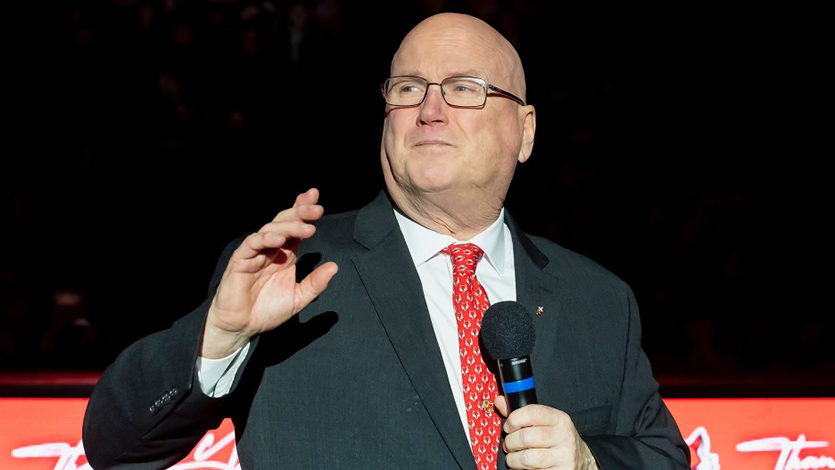
Women’s Basketball Coach Brian Giorgis celebrated after his final home game for making a huge impact both on and off the court.
Women’s Basketball Coach Brian Giorgis celebrated after his final home game for making a huge impact both on and off the court.
02 Mar 2023
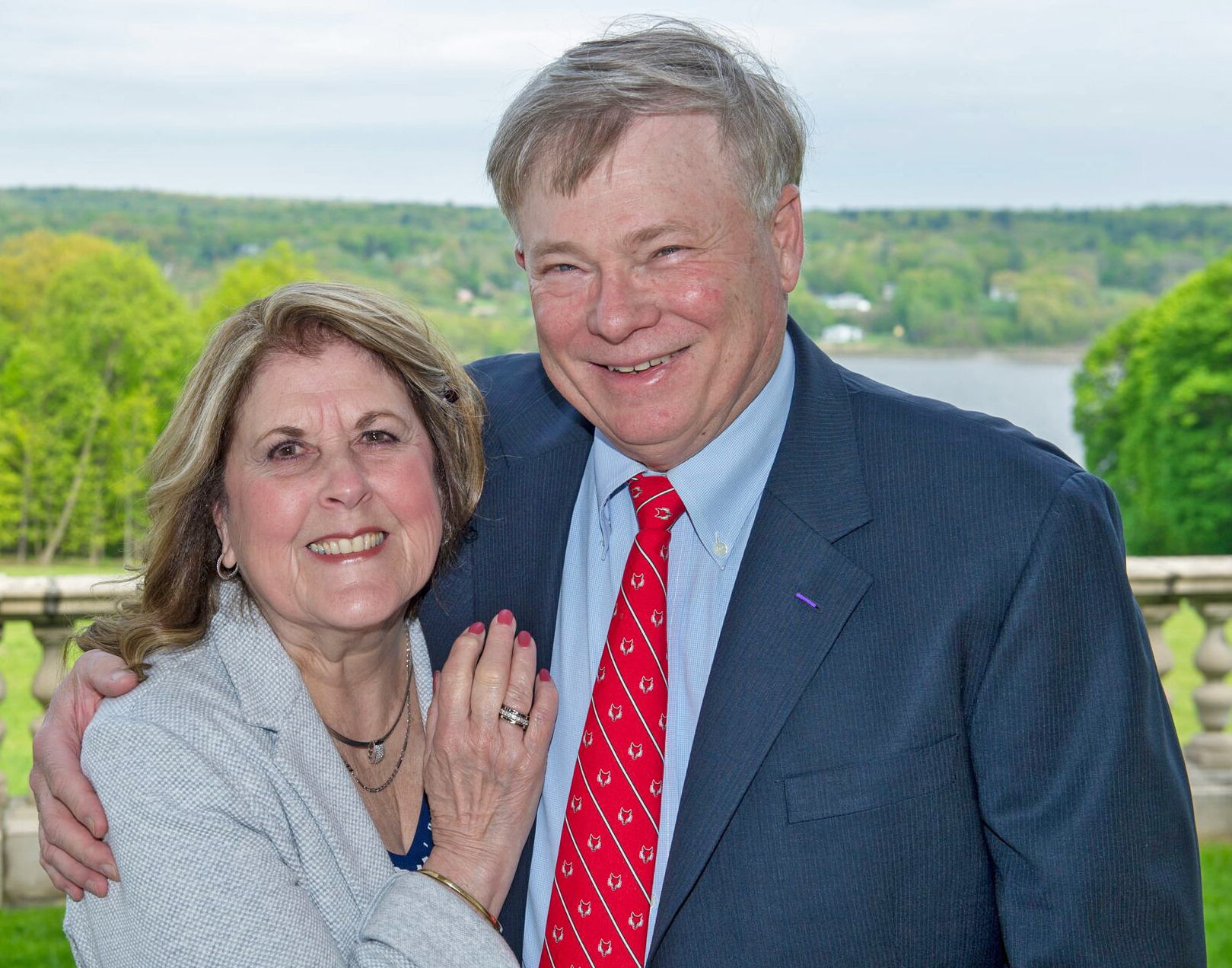
Looking back on two decades of serving students, heritage tourists, scholars, educators, environmental organizations, the business community, and the general public who seek to know more about a region that has been called "the Landscape that defined America."
The Hudson River Valley Institute, a Center of Excellence at Marist dedicated to studying the history and culture of the Hudson River Valley, celebrated its 20th anniversary throughout 2022 with a variety of programs and initiatives involving the Marist community and beyond.To mark the occasion, the staff at the institute wrote an article that appears in the spring 2022 issue of HRVI’s peer-reviewed journal of regional studies, The Hudson River Valley Review. The article highlights many of the organizations (including the National Endowment for the Humanities and the Hudson River Valley National Heritage Area), people, and programs of prominence during the first 20 years and features the evolution of HRVI’s website www.hudsonrivervalley.org, a digital resource that houses materials for researchers, educators, heritage tourists, and the general public. Further, the article recognizes the essential role of the nearly 200 Marist students who have completed internships since 2002.In celebration of the ever-growing group of Marist alumni who have completed an internship, HRVI has been featuring former students in a yearlong social media initiative on Instagram and Facebook. These updates have been seen by more than 20,000 people and show the variety of career paths that can come from the institute’s interdisciplinary internship experiences. In the interview-style spotlights, alumni reflect on the importance of their time at HRVI to their education and work, with careers such as teaching, library sciences, public history, and law all featuring prominently among the individuals recognized. Many intern alumni cite their experience as being a transformative time in their development from undergraduate students to job candidates and professionals, and their work with the HRVI staff as their first experience putting classroom education to use in a professional setting.In addition to a year of celebration, 2022 has also been a year of transition for HRVI. In conjunction with the retirement of Col. (Ret.) James M. Johnson, the institute’s founding executive director and Dr. Frank T. Bumpus Chair in Hudson River Valley History, HRVI launched an ongoing fundraiser to establish the endowed Dr. James M. and Lois S. Johnson Student Research Fund. The fund is designed to enable interns to undertake more impactful experiences and develop more in-depth projects as well as to allow students from a variety of economic backgrounds equal access to the enrichment potential that comes from a fully realized internship with HRVI.“From our beginning, interns have been the lifeblood of HRVI,” said Johnson. “Their work becomes part of HRVI’s publicly available content and provides them with valuable experience that prepares them for graduate school and for their careers. Lois and I have each spent many years as educators and as supporters of Hudson River Valley history, and we are deeply honored to have an initiative that combines both of those passions and bears our names.” To learn more about the Johnson Student Research Fund, visit www.hudsonrivervalley.org/johnsonstudentfund.On Aug. 20, 2022, at Marist’s historic Colonel Oliver Hazard Payne Mansion, HRVI staff, supporters, friends, and intern alumni gathered to formally mark the 20th anniversary of the institute and honor Johnson on his retirement. The program included remarks from HRVI Director Dr. Thomas Wermuth ’84 and Advisory Board Chair Alex Reese among others. Dr. Johnson received a Certificate of Appreciation from New York State Historian Devin Lander recognizing his many contributions to the study of the history of New York, with specific emphasis on his work studying the American Revolution. The guests included approximately 30 former interns dating from the very first group in 2002 through members of the recently graduated Class of 2022, many of whom met for the first time at the event.HRVI’s year of transition continued at the 11th annual Handel-Krom Lecture in Hudson River Valley History on Sept. 29, which was offered as the institute’s first program combining both in-person and virtual attendees after several years of successful programming that was offered online only. The lecture featured author Philip Dray discussing his recently published book, A Lynching at Port Jervis: Race and Reckoning in the Gilded Age. During the event, Wermuth announced HRVI’s Operations Director Andrew Villani ’08/’13MPA as the institute’s new executive director.A former student of Johnson’s and former intern at HRVI, Villani has been a member of the institute’s team since 2008, serving in several different roles.“Our 20th anniversary has been a great opportunity to look back at the early days and celebrate the contributions of our founders, early supporters, and many student interns who helped to get HRVI off the ground,” said Villani. “It has also given us a chance to look to the future and identify new opportunities to build on that growth and success in a meaningful way. I am thrilled and honored to guide the Hudson River Valley Institute into its next 20 years.”Planning is already underway for 2023. “We are already looking at the next round of articles for publication, projects for our internships, and speakers for our two major lectures,” said Villani. “Stay tuned for an exciting array of programs coming up in the near future!”Left to right are Alex Reese, chair of the HRVI Advisory Board; Dr. Thomas Wermuth ’84, HRVI director; Andy Villani, executive director; Col. (Ret.) James M. Johnson, Dr. Frank T. Bumpus Chair in Hudson River Valley History; Christopher Pryslopski, HRVI senior program director; Jason Schaaf, HRVI education coordinator; and Devin Lander, New York State Historian. Photo: Al Nowak/On Location Studios.Guests included approximately 30 former interns. In total, nearly 200 Marist students completed internships with HRVI since the establishment of the institute in 2002. Photo: Al Nowak/On Location Studios
28 Oct 2022
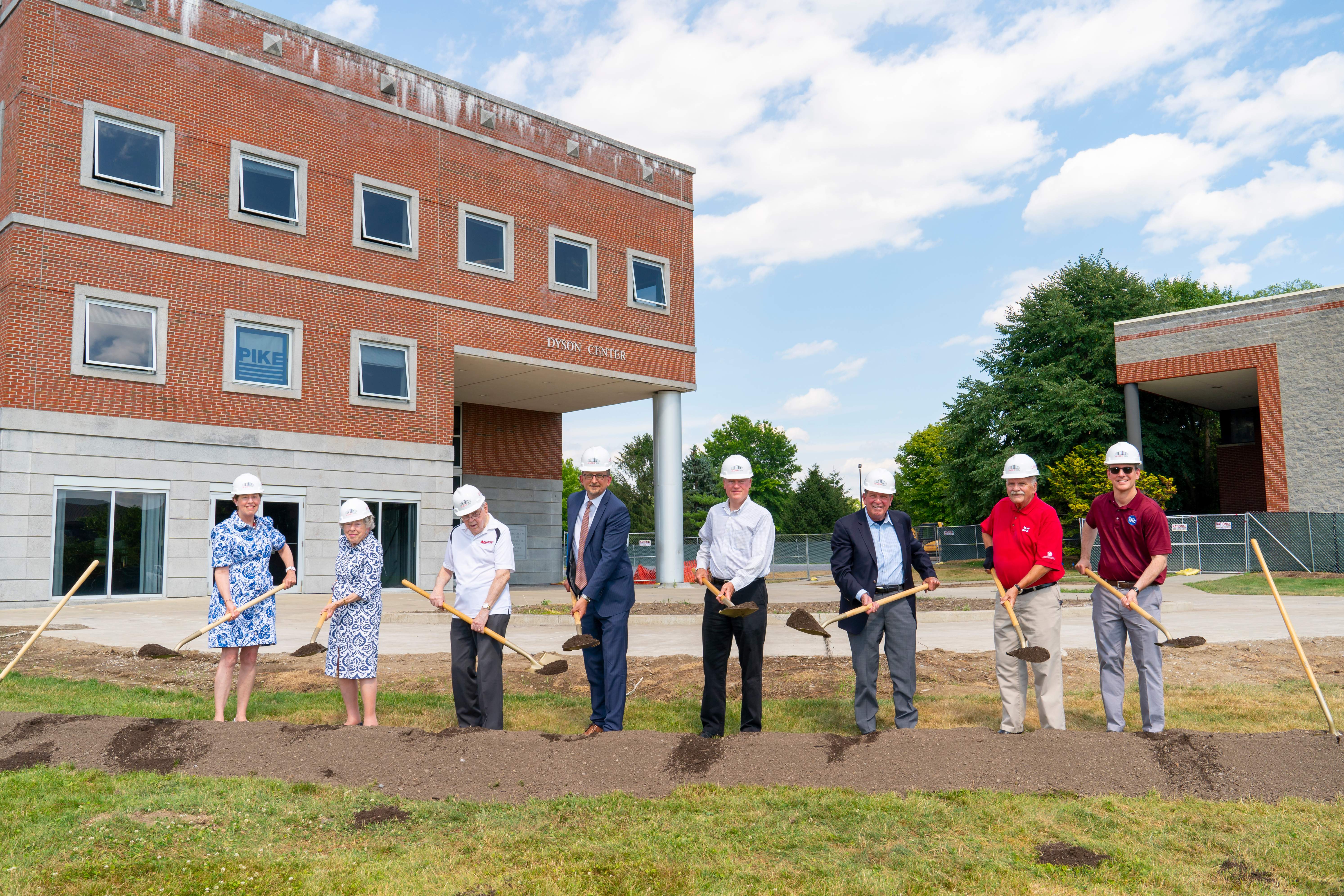
A reimagined home for the School of Management, School of Social and Behavioral Sciences, and Center for Career Services takes shape.
Marist College has officially broken ground on a major expansion and renovation of the Dyson Center, the home of the College’s Schools of Management and Social and Behavioral Sciences. Members of the academic administration, student body, and other dignitaries, led by Marist Trustee and Dyson Foundation Chair Rob Dyson, put shovels in the ground in July for the $60 million project, paving the way for a facility that will serve as a campus centerpiece and will double the size of the former building. The construction project is supported by a lead gift from the Dyson Foundation. Founded in 1957 and based in Dutchess County, the Dyson Foundation works to improve people’s lives through grant funding, promoting philanthropy, and strengthening the capacity of nonprofit organizations. The new Dyson Center, rendering courtesy of Ann Beha Architects, now Annum Architects."I have been in the unique position to watch the incredible growth of Marist over four decades," said Dyson, a past chair of Marist’s Board of Trustees. “It heartens me that the new Dyson Center will be a centerpiece of learning and collaboration for many years to come."The original Dyson Center opened in 1990. The expansion and renovation have been designed by the internationally recognized firm Annum Architects (formerly Ann Beha Architects). The new facility will feature state-of-the-art classrooms; faculty offices; a 150-seat tiered lecture hall; and labs for student–faculty research, especially in the areas of cognitive, developmental, and social psychology.The building will also boast a number of multipurpose collaboration spaces for student and faculty use and will incorporate many sustainable elements, reflecting the College’s long-standing commitment to the environment. There will also be expansive new common areas, including an atrium with a soaring ceiling, a café, a lounge, and abundant social and collaborative space.The Collaborative Study Center in the new Dyson Center. Rendering courtesy of Ann Beha Architects, now Annum Architects.The new Dyson Center will bring a wealth of new resources to the School of Social and Behavioral Sciences and the School of Management. Within the School of Social and Behavioral Sciences, teacher education students will have a new STEM classroom with an adjoining creative space. Psychology, criminal justice, and pre-law students will also be able to use unique learning spaces.The School of Management will include an expanded Student Investment Center with a professional trading floor providing the same technology found on Wall Street. It will also house the school’s Advising Center and the Bureau of Economic Research."The new Dyson Center will be an inspiring place for teaching, learning, research, and collaboration," said Marist President Kevin Weinman. "With its beautiful design, central location, and ample public space for socializing, group study, and individual work and reflection, students of all disciplines will benefit from this truly transformative facility. My sincerest thanks to Rob Dyson and everyone at the Dyson Foundation, Ann Beha, Marist’s Board of Trustees, and President Emeritus Dennis Murray for their work over many years to bring this vision to life.""The new Dyson Center will have specialized spaces for psychology labs, a mock courtroom, a command center, a therapy suite, a K–12 teacher training lab, maker space, and general classrooms configured to maximize current best practices for college instruction," said Dr. Deborah Gatins, dean of Marist’s School of Social and Behavioral Sciences. "I look forward to even more exciting faculty and student collaboration on projects and research.""For School of Management students, this building will create new opportunities to learn in an attractive environment," said Dr. Will Lamb, dean of Marist’s School of Management. "The classrooms are designed to allow our faculty and staff to adapt the layouts to the subject being taught. The new homes for our Investment Center and the Center for Career Services will help students prepare for and launch their careers in exciting new ways. The building will elevate the student experience and help us continue to attract the best and the brightest."The mock courtroom in the new Dyson Center. Rendering courtesy of Ann Beha Architects, now Annum Architects.The Center for Career Services, which offers a variety of programs and resources to assist Marist students and alumni in setting career goals and gaining employment, will also be housed in the Dyson Center."The Center for Career Services is incredibly excited about the new Dyson Center, along with its centralized location giving us a beautiful venue for hosting career and internship fairs, networking events, peer mentoring sessions, alumni/employer panel discussions, and more," said Mary Jones, executive director for the Center for Career Services. "We look forward to continuing to help Marist students achieve their career goals in this reimagined campus centerpiece."The new Dyson Center includes a number of environmentally sustainable initiatives including the adaptive reuse of the existing foundation and structure, highly insulated walls, a high-efficiency HVAC system, and a roof featuring living vegetation installed on top.The building is expected to open in spring 2024. For more photos of the groundbreaking and renderings of the design, visit marist.edu/dyson.A wide array of naming opportunities are available throughout the building. To learn more, please contact Chris DelGiorno, vice president for college advancement, chris.delgiorno@marist.edu
27 Oct 2022
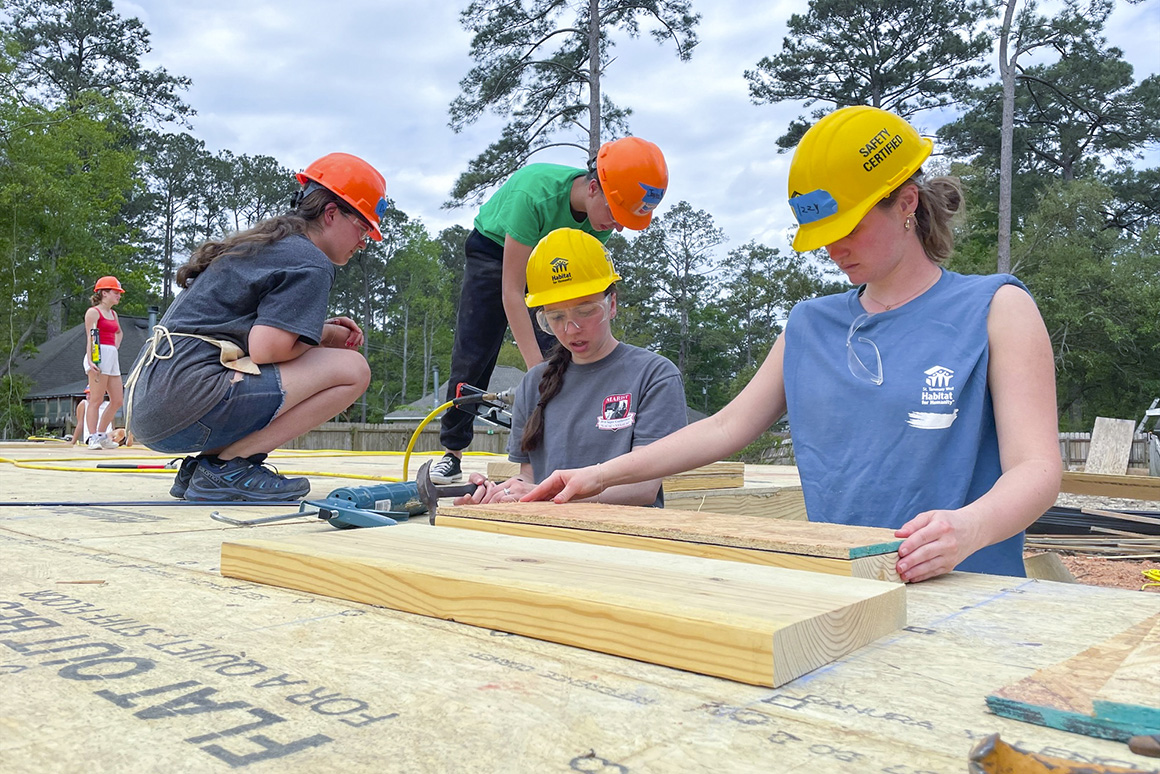
A group of Marist students dedicated their Spring Break to helping families in need.
The College’s Habitat for Humanity Club traveled to Louisiana, where 10 students, led by advisors, worked on building new homes near New Orleans.
13 Apr 2023
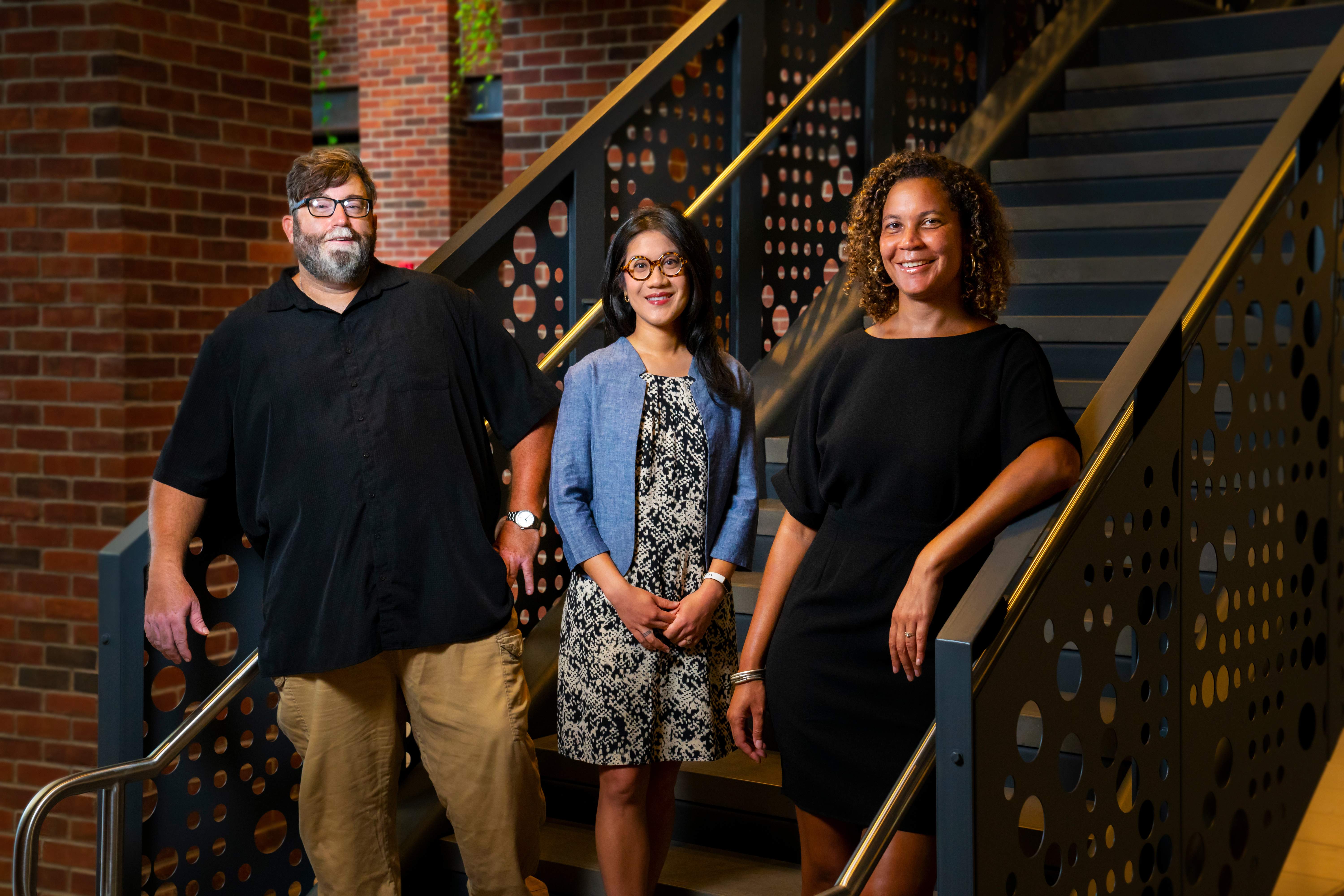
The Marist Mindset List, composed by a trio of Marist faculty, list focuses on a variety of academic disciplines where incoming students are making an impact, and its primary purpose is to give students, their faculty, and even their parents a sense of common ground to spark meaningful conversations, both in and out of the classroom.
The Class of 2026 has arrived, and this year’s group of incoming students has hit the ground running in hopes of being at the back end of the COVID-19 pandemic. This group comes to college having lived much of their high school years with disruptions and due to COVID-19 are looking for a sense of “normal.” This experience has been impactful to this new group of students, who like any incoming class, has a unique take on cultural references and interests.Each year, the Marist Mindset List is crafted as a “cultural compass” exploring the triumphs and challenges for incoming college students. Also known as the “always/never” list, the Marist Mindset List digs into topics spanning public health in addition to political, computer, and environmental sciences as well as fashion and diversity, and equity and inclusion. The list features 10 items in all, which include additional reading in the form of links to sources and, in some cases, living examples of items. Much of the Class of 2026 was born in 2004, so cultural references were entered with that in mind.The list is compiled each year by the Marist Mindset team of Tommy Zurhellen, associate professor of English; Dr. Vanessa Lynn, assistant professor of criminal justice; and Joyce Yu-Jean Lee, assistant professor of art and digital media.“The Marist Mindset List for the Class of 2026 is particularly interesting to me, because we’re seeing how incoming students react to the gradual end of the pandemic that has already affected their academic paths in so many ways,” said Zurhellen. “COVID may be waning, but COVID fatigue is still very much a factor in the choices our students make. This year’s list certainly reflects that unique trend.”“While every Marist Mindset List has explored what touches and impacts an incoming class, this year we also see how many of the phenomena listed impact so many of us,” said Lynn, Marist Mindset Faculty Fellow. “I'm excited about that, because the list can be truly intergenerational.”The annual Mindset List was created at Beloit College in Wisconsin to reflect the world view of entering first year students—and to help faculty understand incoming classes. In 2019, the list moved to Marist, becoming the Marist Mindset List. Under the direction of Zurhellen, who is a Beloit alumnus, the list has become a collaborative effort each year with Marist faculty and students from different disciplines with diverse backgrounds.The 2022 Marist Mindset List for the Class of 2026Sports CommunicationThe Class of 2026 has always known LeBron James as the most recognizable sports icon on the planet. LeBron James entered the NBA in 2003 and in 2004, the year many of the Class of 2026 were born, his jersey topped the best-seller list for the first time; in 2022, James’s jersey still tops the list.Political ScienceFor incoming students, Hillary Clinton has always had a more significant role in American politics than Bill Clinton. Although older Americans may think of Hillary Clinton as primarily First Lady from the 1990s, incoming students born in 2004 only know her as a United States senator, secretary of state, and contemporary presidential candidate.Computer ScienceCreated in 2004, Facebook has been active for the entire lives of the Class of 2026. Although Facebook is only 19 years old, many incoming students already see the social media platform as outdated, preferring newer platforms such as TikTok and Instagram.EthicsIncoming students are the first generation in 50 years who must include their own reproductive rights as part of their overall college decision. The recent Supreme Court decision to overturn Roe v. Wade will affect so many decisions for young women, who currently make up 59 percent of college students in America.Global StudiesThe Class of 2026 will be the first since the “Duck and Cover” generation of the Cold War to live with the real possibility of world war and global conflict. The Russian invasion of Ukraine echoes the experiences of growing up during the Cold War, but today’s digital technology makes the images of war much more visceral.Environmental ScienceThe debate on climate change is over. Incoming students are now the first generation faced with the omnipresent reality to actually effect change to combat global warming. Greta Thunberg has set the stage for youth activism; now, incoming students are part of a new generation increasingly demanding legal reforms to improve future generations’ lives. Diversity, Equity, and InclusionThe Class of 2026 is the first cohort in recent memory for whom knowledge about a diverse country and world is actually regressing. Thirty-five states have recently introduced and/or passed legislation to either ban or censor teaching about race, sexual orientation, gender identity, and American history in schools.Public HealthIncoming students are still recovering from the mental health impact of COVID and COVID fatigue. Mental health has been an issue for some time, but the Class of 2026 is still recovering from the effects of the pandemic on their mental health.EducationThe Class of 2026 is the first to realistically see the possibility of canceling or reducing student debt. The Biden administration has publicly announced its determination to tackle the rise of crippling student debt. Will they get results?FashionIncoming students are aware of fashion sustainability, but nevertheless social media and influencer culture draw them to cheaper and faster options from online retailers. Students have a better understanding of sustainability than previous generations, but their consumer choices do not reflect a strong commitment to protecting the environment.See a full breakdown of this year’s Marist Mindset List for the Class of 2026 here.
28 Oct 2022
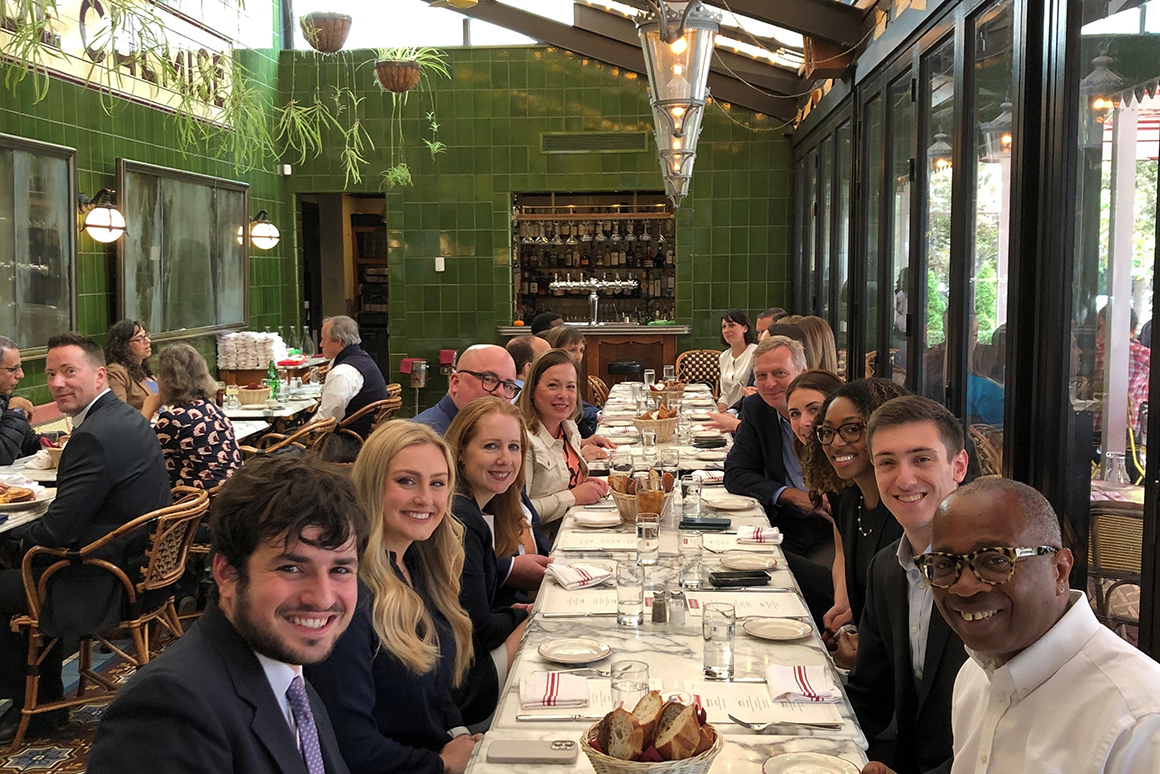
This past fall, the innovative Marist Poll team accurately measured the winners in Senate and gubernatorial contests across the nation, thanks to new, scientific polling methodologies.
This fall, the Marist Poll team tracked public opinion in the most hotly contested Senate and gubernatorial races across the country, and the results were spot-on! The Marist Poll accurately measured the winners in each of the called U.S. Senate and gubernatorial contests polled this election cycle. The Marist Poll’s success this year is the result of the implementation of new, scientific polling methodologies aimed at addressing the broader challenges confronting the polling community.Always innovators in the field of survey research and academia, the Marist Poll rigorously tested these methodologies during the year prior to the 2022 midterms, and the effort proved fruitful. The Marist Poll looks forward to sharing the insights from its election polls with the broader survey community as well as the hundreds of student workers, interns, and researchers who are at the fore of the Marist Poll Survey Center every semester.With an eye on the key issues driving the electorate, the Marist Poll also tracked the 2022 midterm elections with its national polling partners, NPR and PBS NewsHour. The NPR/PBS NewsHour/Marist Poll measured public opinion on President Joe Biden’s job performance, the economy, the labor force, and much more. In total, the Marist Poll conducted 12 public battleground state polls and 2 national surveys since Sept. 1, generating an estimated ad value equivalency of more than $300 million, according to the media monitoring service Meltwater.Also last fall, it was the Marist Poll’s distinguished pleasure to participate in the Office of College Advancement’s October event for the Washington, DC, alumni chapter. These two action-packed days began with an informal dinner with Marist President Kevin Weinman and distinguished political journalists with whom the Marist Poll has worked over the decades. The Marist Poll also hosted a luncheon where Marist Poll alumni had the chance to get to know President Weinman. The culmination of the trip was the broader gathering of Marist’s DC alumni chapter during which Dr. Lee Miringoff, director of the Marist Institute for Public Opinion, had the distinct honor of leading the discussion between Weinman and Marist’s best and brightest. From Marist students past to the present, undergraduates in Miringoff’s Political Communication and Politics course have, once again, experienced an insider’s view of the field. On-campus and virtual guest speakers this semester have included Congressman Jamie Raskin, author of Unthinkable: Trauma, Truth, and the Trials of American Democracy and who served as the lead impeachment manager in the second impeachment trial of former President Donald Trump; Lisa Desjardins, PBS NewsHour correspondent; Steve Thomma, executive director of the White House Correspondents Association; David Lightman, chief congressional correspondent for McClatchy; and Ron Brownstein, CNN senior political analyst and senior editor at The Atlantic.The Marist Poll would also like to take a moment to thank Marist alumni, staff, and friends of the College who contributed to the Marist Poll’s GiveCampus campaign. Those generous donations funded two student fellowship positions. The Marist Poll Summer Fellow for Distinguished Service in Media was awarded to Greta Stuckey ’23 who demonstrated outstanding journalistic integrity, exemplary writing and research skills, a passion for the media industry, and proven leadership ability. Sarah Knauss ’23 was named the Marist Poll Summer Fellow for Distinguished Service in Data Science which is awarded to a Marist College student who demonstrates exceptional analytical writing and research skills, exhibits a strong interest in the field of survey research and/or data analysis, and is a proven leader. For those who might have missed it, the Marist Poll, in conjunction with the Marist Center for Sports Communication, surveyed Americans about Title IX, 50 years after the passage of this groundbreaking legislation. To commemorate the anniversary of Title IX in June, the Marist Poll and the Marist Center for Sports Communication hosted a virtual panel featuring female luminaries in sports, broadcasting, and policy. Marist Poll Director of Data Science and Technology Stephanie Calvano ’04 moderated the panel which included Margaret Dunkle, architect of Title IX; Aditi Kinkhabwala, former national reporter for the NFL Network; Rebecca Lobo, WNBA and women’s college basketball analyst and reporter for ESPN and former WNBA All-Star; Jane McManus, executive director of Seton Hall’s Center for Sports Media; and Julianne Viani ’08, basketball analyst in sports broadcasting for ESPN, CBS Sports Network, NBC Sports, and YES Network, as well as other networks.
15 Feb 2023
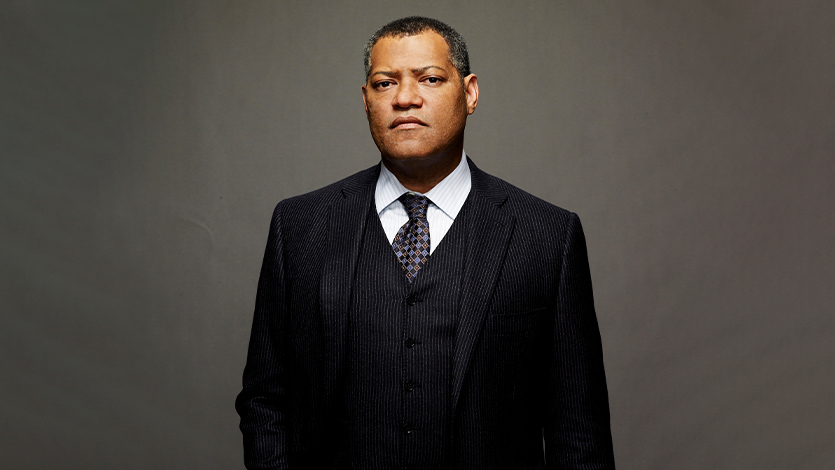
NYSAF will work with the College to lend professional expertise to its curricular programs as Marist students serve as interns and staff members.
New York Stage and Film at Marist College returns to Poughkeepsie July 14-August 6 for its 2023 Summer Season, which will feature a combination of emerging artists and Hollywood and Broadway headliners.
27 Mar 2023
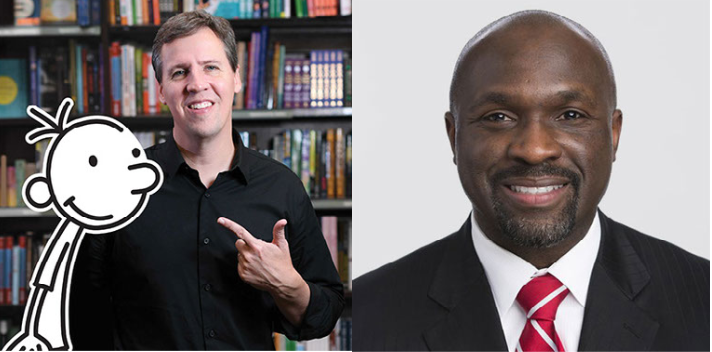
Best-selling author Jeff Kinney will address traditional undergraduates of the Class of 2023 at Marist’s commencement ceremony May 20 and adult undergraduate, master’s, and doctoral students will be honored the night before with Jerome Pickett ’98 as their commencement speaker.
Best-selling author of the popular Diary of a Wimpy Kid series and cartoonist Jeff Kinney will address traditional undergraduates of the Class of 2023 at Marist College’s Commencement ceremony on Saturday, May 20 on the Campus Green. Adult undergraduate, master’s and doctoral students will be honored the night before, with esteemed Class of 1998 Marist alumnus, Jerome Pickett, serving as Commencement speaker.
28 Mar 2023
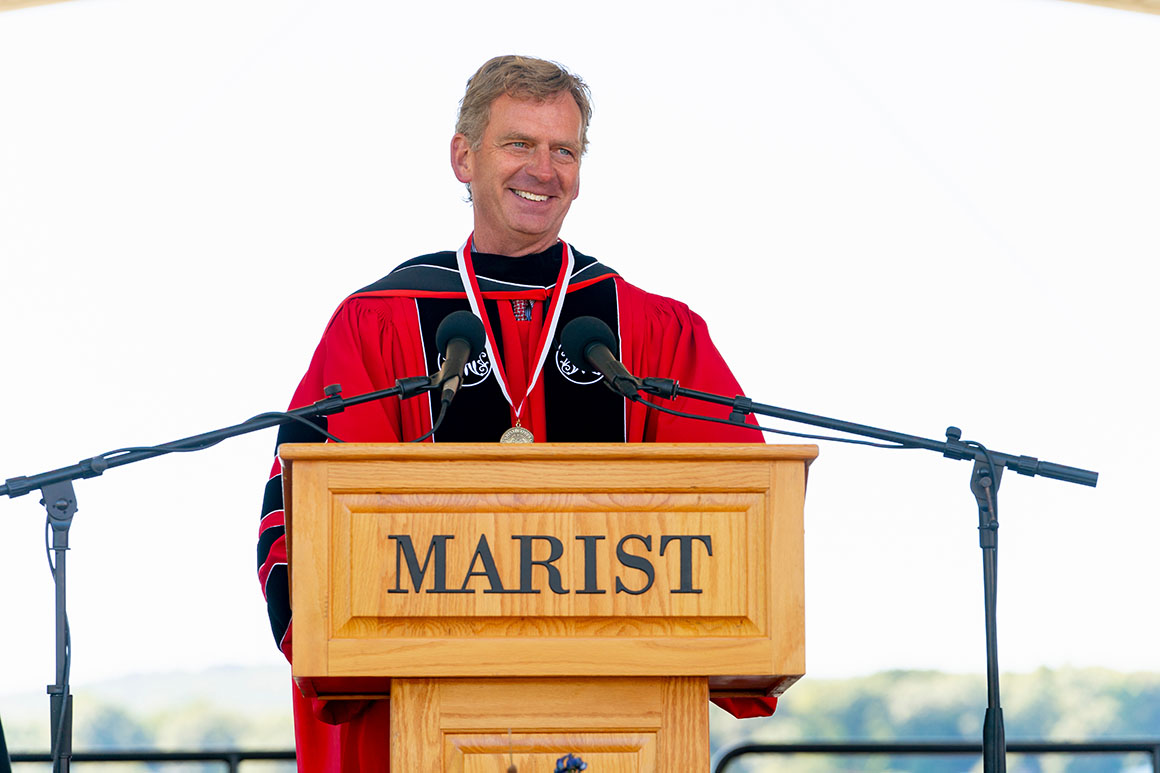
The College celebrates its past and charts a course for its future as Kevin Weinman is installed as Marist’s fifth president.
The inauguration of President Kevin Weinman as Marist College’s fifth president last September was a day of excitement and pride, as the Marist community and representatives across higher education came together to celebrate an institution rich in history and well-positioned to thrive in the years ahead.Thousands of individuals gathered on the Campus Green on Sept. 23 on a picturesque autumn day, including students, faculty, staff, alumni, local community leaders, and friends of the College. Delegates from 51 other colleges and universities across the country also made the trip to Poughkeepsie, including representatives from Amherst, Dartmouth, Harvard, Yale, Princeton, University of New Hampshire, Notre Dame, and Columbia. Many of the delegates had not visited Marist before and expressed how struck they were by the College’s beautiful campus, state-of-the-art facilities, and deep sense of community.Kevin Weinman onstage during the ceremony, prior to removing the robes associated with his earned degree and donning the Marist College presidential gown.A focal point of President Weinman’s remarks highlighted one of Marist’s most distinctive qualities: the blend of a liberal arts education and preprofessional training that is at the heart of a Marist education and is key to solving society’s most pressing problems. “As you know, there is much debate about the continuing value of the liberal arts compared to a form of education that focuses on professional training. I don’t understand this. In fact, I see no debate here at all,” he said. “The debate between the relative merits of a liberal arts education versus professional education presumes that we must choose one or the other. We don’t. Not only can they co-exist, they are mutually reinforcing. This is especially true at Marist College. Here, we aspire to and, not or.”This unique combination is what has prepared generations of Marist graduates for success and is a big part of what attracted Weinman to the College, in addition to its very student-centric culture. “You are why I am here,” he said, addressing the students directly. “You inspire me each and every day. It will be my never-ending mission to help you get the most out of your Marist experience.”Marist Student Government Association President Gabriel Borbon ’23 spoke on behalf of the student body, praising Weinman’s strong commitment to engaging with students from the moment he joined Marist as president on Oct. 4, 2021.“Dr. Weinman’s first meeting on his very first day was with the student government. That fact alone should tell you a lot about how much he values the students at Marist,” Borbon said. “In one short year, he has shown that he is dedicated to helping students develop the intellect, character, and skills required for enlightened, ethical, and productive lives. I think the Marist community can rest assured that the future of Marist College is bright and that there are even better days to come.”Dr. Carolyn “Biddy” Martin, president emerita at Amherst College, who was president of Amherst while Weinman served as Amherst’s chief financial and administrative officer, delivered the keynote address.“Kevin’s forms of expertise are so wide-ranging, certainly in finance, in computation and data-driven analysis, but he combines those with an appreciation of the imaginative arts, and the rigorous reading and analytic methods of the humanities. That is what students, and the rest of the world, need. All of that," Martin said. "In addition to his other qualities, you will find Kevin’s steadiness and his positive outlook make him an ideal person to lead. Kevin is truly a connector of fields, professions, opportunities, and people. What we see here today is evidence of that.”A ceremony that celebrated the College’s history, academic mission, and rich traditions was balanced with fun, lighthearted moments and even a bit of humor. In a video, Word on the River student host Joe Tuosto ’23 challenged Weinman to taste-test a popular student sandwich mashup from the North End café: putting a chicken sandwich on top of a grilled cheese. Weinman’s verdict after his first bite: “That is everything I’d imagine it would be.” In her keynote, Martin told a few tales on her former colleague. On the subject of Marist’s campus in Florence, Italy, she said, “I noted with interest that your new president hadn’t been here a year before he decided he needed to visit that [campus].”During the ceremony, Weinman’s son, Alex, recalled the day his father introduced him to the game of golf. “While he tried to teach me lessons about stance, grip, and follow-through, the most important lesson I learned for being on the golf course with him is this: stand far behind my dad when he’s swinging a golf club. No one is safe when Kevin Weinman takes a swing.”Weinman’s daughter, Brooke, and his wife, Beth, also played key roles in the ceremony. Brooke performed River Flows in You by Yiruma on the piano, and Beth shared reflections about her husband.“I have known Kevin for over 28 years now. Throughout this time, he has always worked hard and dedicated himself to making the lives of those around him better, but I have never seen him so excited about an opportunity to make a difference as he is here at Marist,” Beth Weinman said. “Marist, you are getting someone who does not do anything halfway, who tries to be everywhere all the time, and who cares deeply for everyone he’s around.”In acknowledging President Emeritus Dennis Murray, President Weinman noted it is Murray’s “vision and leadership for nearly 40 years that transformed Marist into the remarkable college it is today.” As a result, the institution is well positioned for continued growth and success. “Even as we celebrate the Marist here today, I am already looking ahead to our centennial in 2029,” said Weinman. “My dream includes both an epic celebration of the conclusion of a remarkable first century and a launchpad for an even more amazing second century.”He identified two key areas that will drive Marist forward into its next 100 years: innovate, and innovate relentlessly, and make Marist’s form of education available and accessible to any student who has the talent and drive to succeed here. He invited not only current students, faculty, and staff to help advance this ambitious vision, but also alumni who have been core to getting Marist to where it is today.Weinman touted past achievements of the Marist community that have made innovation part of the school’s DNA, such as its 34-year partnership with IBM, world-renowned Fashion Program, thriving branch campus in Florence, Italy, and nationally recognized online programs. “As we are innovating and improving, we are also opening our campus to an ever more diverse and talented group of students,” he added. “We must continue to focus on making a Marist education accessible to every student who can succeed here. Every student must feel a sense of belonging … I won’t rest until we achieve this important goal.”These bold priorities, coupled with a new strategic plan, which is expected to be completed in May 2023, will give alumni, students, faculty, staff, and parents countless opportunities and different ways to engage to help shape and contribute to the Marist of the future.Weinman concluded his address by noting that the Hudson River represents Marist’s values, community, and aspirations. “It supports incredible biodiversity and contributes to the vibrancy of life in the region. In this way the river mirrors the human diversity and richness of Marist College. I tell Marist students all the time … their lives are going to be complicated. Like this stunning river, the crosscurrents they face will be relentless and unpredictable. Their Marist education equips them to succeed no matter what comes their way.” The inauguration ceremony was the culmination of two days of activities that showcased the best of the Marist community. It included an open house at the Steel Plant Studios featuring the work of faculty, students, and alumni from the Art Department and Fashion Program; installations of student and alumni research and creative activity; an academic symposium showcasing Marist faculty and “snap talks” where select faculty presented research. After the inauguration, all were welcome at a reception on the Champagnat Green.To see inauguration events, including video of the full ceremony and the entire slate of campus activities, visit https://www.marist.edu/inauguration.
28 Mar 2023